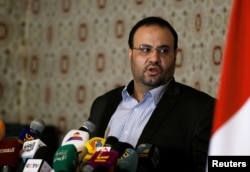The United Nations suspended peace talks Saturday between Yemen's Sunni government and Shi'ite Houthi rebels, after rebels moved forward with a unilateral plan to appoint a governing council in areas seized since fighting erupted in 2014.
U.N. peace envoy Ismail Ould Cheikh Ahmed announced the suspension in Kuwait, saying he would work separately in the coming weeks with negotiators from both sides to reach agreement on key elements in a U.N. plan to establish peace on the Arabian peninsula.
"The biggest dilemma we faced was a deficit in trust between the parties, and in this regard we focused on the necessity of offering concessions" by both sides, Ould Cheikh Ahmed said.
The envoy also urged both sides to initiate confidence building measures and to "refrain from adopting unilateral measures."
"We may not have arrived at a [peace] announcement before departing Kuwait, but I repeat that we are on the right track," Ould Cheikh Ahmed added. He refused to call the current talks a failure, though they made no tangible headway toward peace, and further said that the formation of a Houthi governing council was not in the interests of Yemen or the peace process.
No date or venue has been announced for further negotiations, but Ould Cheikh Ahmed said they could resume within a month.
The U.N. sponsored two rounds of peace talks last year, but those efforts collapsed in January under the weight of an outbreak of fierce combat that lasted for weeks. Fighting has continued, though with less intensity, since the Kuwait talks resumed in April.
The government of President Abdu Rabu Mansour Hadi, which backed the latest U.N. proposals, has demanded that rebels withdraw from all territory gained since hostilities erupted in September 2014, when Iran-backed Houthi fighters seized the capital, Sana'a, after years of allegations about government discrimination.
Monitors say at least 6,500 people have been killed in the fighting, including more than 3,200 civilians.
Hadi continues to demand a full rebel withdrawal, while Houthis demand a share of power in any new government.
A 2015 Houthi offensive in southern Yemen allowed rebels to temporarily seize the port city of Aden, a gain that sent Hadi into months of exile in neighboring Saudi Arabia.
The Saudis responded by forming a regional coalition of Sunni governments, which later began launching airstrikes in defense of Hadi's presidency.






